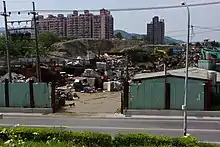Landfills in Taiwan
In Taiwan, 2% of its municipal solid waste is disposed of by landfill.[1] As of 2013, there are a total of 404 landfills in Taiwan.[2] Public landfills in Taiwan can be divided into sanitary landfill and basic landfill. The former has detailed regulations specifying it to prevent secondary pollution while the latter has none.[3]

History
Taipei's official landfill moved from near Songshan Airport to what became known as Neihu Garbage Mountain in Huzhou, Neihu District, in 1970. This location handled Taipei's waste disposal needs until 1985, when the Fudekeng location became operational.[4] The first sanitary landfill in Taiwan was constructed in 1984.[2]
Issues
Due to the land scarcity in Taiwan, building new landfills is difficult and is often met with opposition from nearby residents.[5] Common problems caused by landfills are increased traffic volume, higher noise level and damage caused by vibration.[6] Companies generally need around two years to construct a new landfill, due to lengthy negotiations with local residents who usually oppose the construction. There are also many illegal landfills in Taiwan which do not meet the minimum standard requirement. In summer 1997, trash were pilling up on the streets of Zhongli City, Taoyuan County for several weeks due to the unavailability of new landfills.[3]
Landfill restorations
Many of the landfills that have reached their capacity have been converted into parks and community centers.[1] The Environmental Protection Administration stated in 2011 that they would excavate old landfills for some materials and energy recovery, as well as adding bio-energy to the incinerator plants around Taiwan.[7]
In mid 2013, the Taipei City Government reopened the restored Shanzuku Landfill as the Shanshuilu Eco Park in Nangang District, Taipei.[8]
On 17 February 2017, Taipei Mayor Ko Wen-je inaugurated Taipei Energy Hill, the first landfill-based photovoltaic power station in Taiwan. The area used to be the site for Fude Landfill until 1994 and has been turned into an environmental park in 2003.[9]
In 2017, AU Optronics won a tender to construct a 3.5 MW photovoltaic power station in a former landfill site at Guanmiao District, Tainan.[10]
See also
References
- Stocker, Mark (30 October 2017). "Taiwan Must Own its Global Leadership in Recycling - The News Lens International Edition".
- http://photo.ntio.org.tw/trade/Waste%20Management%20in%20Taiwan.pdf
- "Environmental Technologies Industries -Market Plans". web.ita.doc.gov.
- Han Cheung (10 July 2022). "Taiwan in Time: 'Garbage Mountain' ablaze". Taipei Times. Retrieved 10 July 2022.
- (Taiwan), Ministry of Foreign Affairs, Republic of China (1 August 1993). "Garbage Wars - Taiwan Today". Taiwan Today.
{{cite web}}: CS1 maint: multiple names: authors list (link) - "Archived copy" (PDF). Archived from the original (PDF) on 7 November 2017. Retrieved 4 November 2017.
{{cite web}}: CS1 maint: archived copy as title (link) - "Landfill Mining and Energy Recovery Planned in Taiwan". 28 March 2011.
- https://www.eventaiwan.tw/en/news/detail_6034_2501
- (Taiwan), Ministry of Foreign Affairs, Republic of China (20 February 2017). "Taiwan launches 1st landfill-based solar power plant - Taiwan Today". Taiwan Today.
{{cite web}}: CS1 maint: multiple names: authors list (link) - "AUO Delivers All-Round Solar Power Plants Ranging from Rooftop, Ground Mount and Floating Types - CTIMES News".